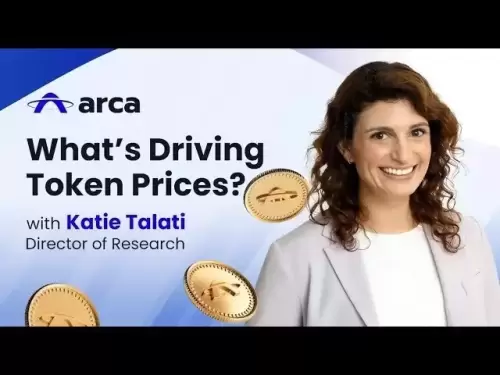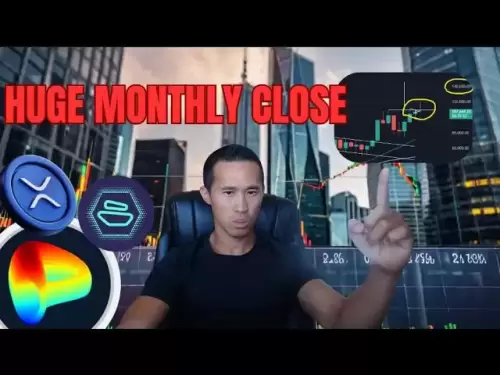-
 Bitcoin
Bitcoin $107,443.3008
-1.17% -
 Ethereum
Ethereum $2,494.2503
-0.63% -
 Tether USDt
Tether USDt $1.0003
0.00% -
 XRP
XRP $2.2496
2.23% -
 BNB
BNB $658.7569
0.63% -
 Solana
Solana $154.9826
1.94% -
 USDC
USDC $1.0000
0.01% -
 TRON
TRON $0.2799
1.07% -
 Dogecoin
Dogecoin $0.1659
-1.78% -
 Cardano
Cardano $0.5745
0.25% -
 Hyperliquid
Hyperliquid $39.7005
0.13% -
 Bitcoin Cash
Bitcoin Cash $519.5989
3.78% -
 Sui
Sui $2.7874
-2.40% -
 Chainlink
Chainlink $13.3762
-1.69% -
 UNUS SED LEO
UNUS SED LEO $9.0784
-0.64% -
 Avalanche
Avalanche $17.9846
-2.81% -
 Stellar
Stellar $0.2390
-0.06% -
 Toncoin
Toncoin $2.9028
0.25% -
 Shiba Inu
Shiba Inu $0.0...01147
-2.17% -
 Litecoin
Litecoin $86.6956
-1.27% -
 Hedera
Hedera $0.1508
-0.50% -
 Monero
Monero $322.6222
3.26% -
 Polkadot
Polkadot $3.4124
-2.99% -
 Dai
Dai $0.9999
0.00% -
 Bitget Token
Bitget Token $4.5434
-1.97% -
 Ethena USDe
Ethena USDe $1.0002
0.00% -
 Uniswap
Uniswap $7.1562
-2.61% -
 Aave
Aave $275.8830
-1.02% -
 Pepe
Pepe $0.0...09790
-4.04% -
 Pi
Pi $0.5018
-5.09%
How to connect the Exodus wallet with the DeFi platform?
Connect your Exodus wallet to DeFi platforms like Uniswap and Aave for lending, borrowing, and yield farming, enhancing your crypto experience safely.
Apr 05, 2025 at 08:29 pm
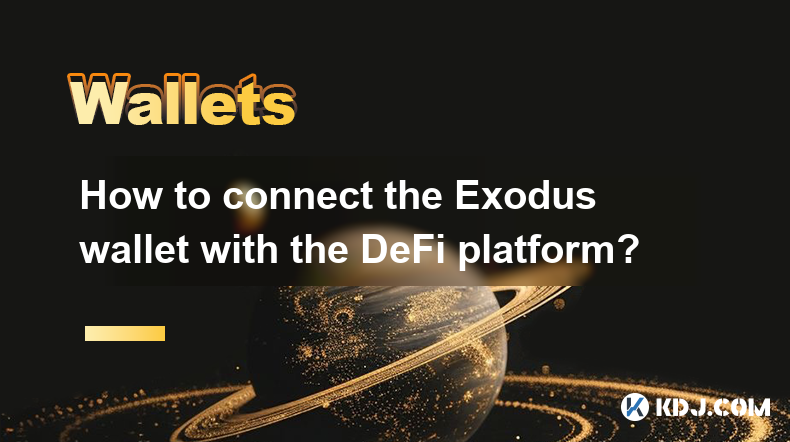
Connecting your Exodus wallet to a DeFi platform can enhance your cryptocurrency experience by allowing you to participate in decentralized finance activities such as lending, borrowing, and yield farming. Exodus is a user-friendly, multi-currency wallet that supports a variety of cryptocurrencies, making it a popular choice for those looking to dive into DeFi. To successfully connect your Exodus wallet to a DeFi platform, you'll need to understand the process and ensure you're using compatible platforms. This article will guide you through the steps and considerations for making this connection, ensuring you can safely and effectively engage with DeFi opportunities.
Understanding Exodus Wallet and DeFi Platforms
Before connecting your Exodus wallet to a DeFi platform, it's essential to understand what each component offers. Exodus is a desktop and mobile wallet that supports over 100 cryptocurrencies, including Bitcoin, Ethereum, and many ERC-20 tokens. It's known for its intuitive interface and built-in exchange feature, which allows users to swap between different cryptocurrencies directly within the wallet.
DeFi platforms, on the other hand, are decentralized applications (dApps) built on blockchain networks like Ethereum. They enable users to access financial services without traditional intermediaries. Popular DeFi platforms include Uniswap, Aave, and Compound, each offering different services such as decentralized exchanges, lending, and borrowing.
Preparing Your Exodus Wallet for DeFi
To connect your Exodus wallet to a DeFi platform, you'll first need to ensure your wallet is set up correctly. Here are the steps to prepare your Exodus wallet:
- Install and Set Up Exodus: Download the Exodus wallet from the official website and follow the installation instructions. Create a new wallet or restore an existing one using your 12-word recovery phrase.
- Add the Necessary Cryptocurrencies: Ensure you have the cryptocurrencies you want to use on the DeFi platform added to your Exodus wallet. For most DeFi platforms, you'll need Ethereum (ETH) or other ERC-20 tokens.
- Secure Your Wallet: Enable two-factor authentication (2FA) and consider using a hardware wallet for added security. Always keep your recovery phrase safe and never share it with anyone.
Choosing a Compatible DeFi Platform
Not all DeFi platforms are compatible with Exodus, so it's crucial to choose one that supports wallet connections via the methods Exodus offers. Here are some popular DeFi platforms that you can connect to using Exodus:
- Uniswap: A decentralized exchange that allows you to swap ERC-20 tokens. You can connect to Uniswap using your Exodus wallet's Ethereum address.
- Aave: A lending and borrowing platform where you can deposit assets to earn interest or borrow against your collateral. Aave supports connections via Ethereum addresses.
- Compound: Another lending and borrowing platform that allows you to earn interest on your crypto assets. You can connect to Compound using your Ethereum address from Exodus.
Connecting Exodus Wallet to a DeFi Platform
Once you've chosen a compatible DeFi platform, follow these steps to connect your Exodus wallet:
- Open Your Exodus Wallet: Launch the Exodus application on your desktop or mobile device.
- Select the Cryptocurrency: Choose the cryptocurrency you want to use on the DeFi platform, such as Ethereum.
- Copy Your Ethereum Address: Click on the "Receive" button for the selected cryptocurrency, and copy the Ethereum address provided.
- Visit the DeFi Platform: Open the DeFi platform's website in your browser. For example, if you're using Uniswap, go to app.uniswap.org.
- Connect Your Wallet: Look for the "Connect Wallet" or similar button on the DeFi platform. Select "WalletConnect" or "Custom Token" as the connection method.
- Enter Your Ethereum Address: Paste your Exodus Ethereum address into the provided field on the DeFi platform. Confirm the connection.
Using Your Connected Exodus Wallet on DeFi Platforms
After successfully connecting your Exodus wallet to a DeFi platform, you can start using the platform's services. Here's how you can interact with different DeFi platforms:
- Swapping Tokens on Uniswap: If you're connected to Uniswap, you can swap your ERC-20 tokens. Select the tokens you want to swap, enter the amount, and confirm the transaction. The transaction will be signed using your Exodus wallet.
- Lending and Borrowing on Aave: On Aave, you can deposit your assets to earn interest or borrow against your collateral. Navigate to the "Deposit" or "Borrow" section, select your asset, and confirm the transaction through your Exodus wallet.
- Earning Interest on Compound: With Compound, you can supply assets to earn interest. Go to the "Supply" section, choose your asset, and confirm the transaction using your Exodus wallet.
Security Considerations When Using DeFi with Exodus
While connecting your Exodus wallet to DeFi platforms can be rewarding, it's important to consider the security implications. Here are some tips to keep your assets safe:
- Use Strong Passwords and 2FA: Always use a strong, unique password for your Exodus wallet and enable two-factor authentication.
- Beware of Phishing Scams: Be cautious of fake websites and emails that may try to steal your private keys or recovery phrase. Always double-check the URL of the DeFi platform you're using.
- Monitor Your Transactions: Regularly check your transaction history on both your Exodus wallet and the DeFi platform to ensure no unauthorized transactions have occurred.
- Keep Your Software Updated: Ensure that both your Exodus wallet and the DeFi platform you're using are up to date with the latest security patches.
Troubleshooting Common Issues
Connecting your Exodus wallet to a DeFi platform can sometimes present challenges. Here are some common issues and how to resolve them:
- Connection Errors: If you're having trouble connecting your wallet, ensure you're using the correct Ethereum address and that the DeFi platform supports WalletConnect or custom token connections.
- Transaction Failures: If a transaction fails, check your gas fees and ensure you have enough ETH in your wallet to cover them. Sometimes, increasing the gas fee can help the transaction go through.
- Platform Compatibility: If the DeFi platform you're trying to use doesn't support Exodus directly, consider using a compatible wallet like MetaMask as an intermediary. You can transfer your assets from Exodus to MetaMask and then connect to the DeFi platform.
Maximizing Your DeFi Experience with Exodus
To get the most out of your DeFi experience with Exodus, consider the following strategies:
- Diversify Your Investments: Spread your assets across different DeFi platforms to minimize risk. For example, you might lend on Aave, swap on Uniswap, and earn interest on Compound.
- Stay Informed: Keep up with the latest developments in the DeFi space. Follow reputable sources and join communities to stay updated on new opportunities and potential risks.
- Use DeFi Aggregators: Consider using DeFi aggregators like Zapper or Yearn Finance to manage your DeFi investments more efficiently. These platforms can help you track your assets across multiple DeFi protocols.
Common Questions Related to Connecting Exodus Wallet with DeFi Platforms
Q: Can I connect my Exodus wallet to any DeFi platform?
A: Not all DeFi platforms are compatible with Exodus. You need to ensure the platform supports connections via WalletConnect or custom token addresses, which Exodus can provide.
Q: Is it safe to connect my Exodus wallet to a DeFi platform?
A: While connecting your Exodus wallet to a DeFi platform can be safe, it's important to take security measures such as using strong passwords, enabling 2FA, and being cautious of phishing scams.
Q: What should I do if I encounter a transaction error on a DeFi platform?
A: If you encounter a transaction error, check your gas fees and ensure you have enough ETH to cover them. Sometimes, increasing the gas fee can help the transaction go through. Also, ensure you're using the correct Ethereum address.
Q: Can I use my Exodus wallet to swap tokens on Uniswap?
A: Yes, you can connect your Exodus wallet to Uniswap and use it to swap ERC-20 tokens. Follow the steps outlined in this article to connect and start swapping.
Q: How can I maximize my returns using DeFi with my Exodus wallet?
A: To maximize your returns, diversify your investments across different DeFi platforms, stay informed about the latest developments, and consider using DeFi aggregators to manage your investments more efficiently.
Disclaimer:info@kdj.com
The information provided is not trading advice. kdj.com does not assume any responsibility for any investments made based on the information provided in this article. Cryptocurrencies are highly volatile and it is highly recommended that you invest with caution after thorough research!
If you believe that the content used on this website infringes your copyright, please contact us immediately (info@kdj.com) and we will delete it promptly.
- North Korea's Cyber Plot: Funding Weapons Development Through Virtual Heists
- 2025-07-01 10:30:12
- Undervalued Crypto Tokens: Compute Tokens Stealing the Show?
- 2025-07-01 10:50:12
- XRPL EVM Sidechain: Unleashing Smart Contracts and Cross-Chain DeFi on XRP
- 2025-07-01 10:30:12
- Archaeology Unearths Ancient Coin Moulds: A Glimpse into Indo-Greek Trade in Gujarat
- 2025-07-01 10:50:12
- MAGACOIN FINANCE: Altcoin Returns & the Early Adoption Advantage
- 2025-07-01 11:10:12
- Neo Pepe: Is This Presale the Crypto Opportunity You've Been Waiting For?
- 2025-07-01 11:10:12
Related knowledge
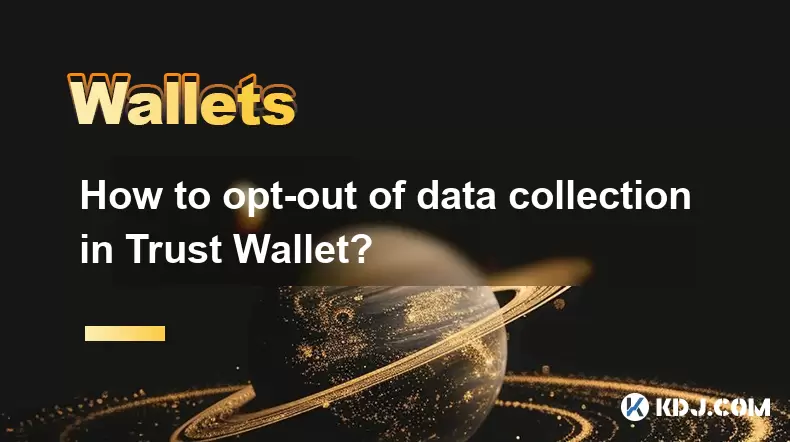
How to opt-out of data collection in Trust Wallet?
Jul 01,2025 at 12:22pm
Understanding Data Collection in Trust WalletTrust Wallet, a popular mobile cryptocurrency wallet, collects certain types of data to enhance user experience and ensure the security of transactions. This data may include device information, usage patterns, crash reports, and anonymous analytics. While Trust Wallet emphasizes that it does not store privat...
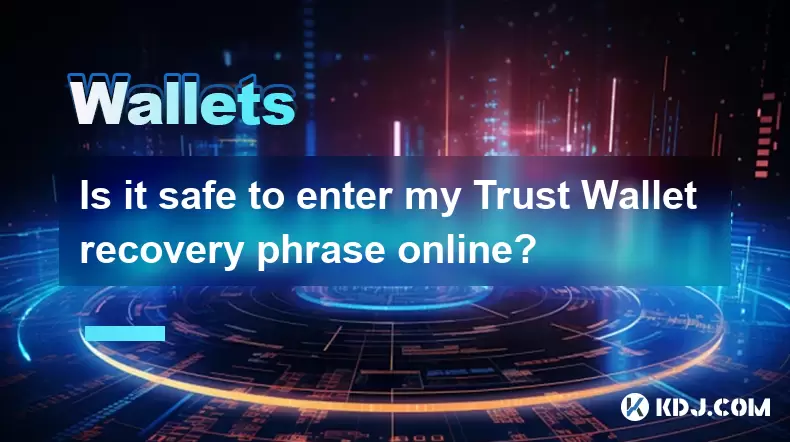
Is it safe to enter my Trust Wallet recovery phrase online?
Jul 01,2025 at 11:42am
Understanding the Role of a Recovery Phrase in Trust WalletA recovery phrase, also known as a seed phrase, is a sequence of 12 or 24 words generated during the initial setup of your Trust Wallet. This phrase acts as the ultimate backup to your wallet and grants access to all your funds stored within it. It is essentially the master key to your digital a...
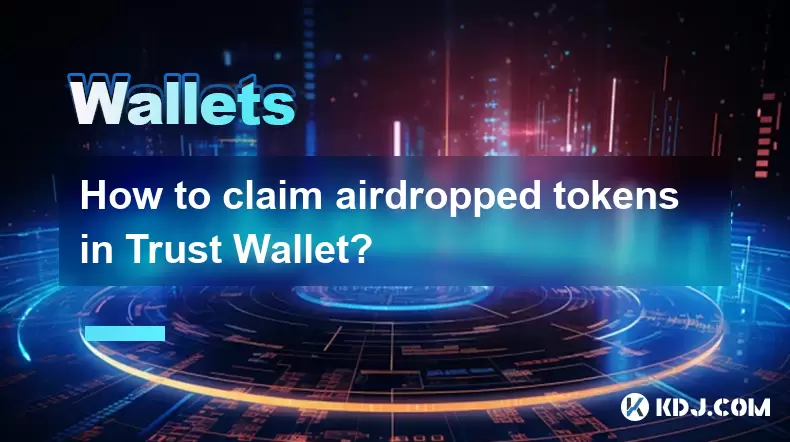
How to claim airdropped tokens in Trust Wallet?
Jul 01,2025 at 12:29pm
What Is an Airdropped Token?An airdropped token is a type of cryptocurrency distributed for free to wallet addresses, often as part of a marketing strategy or blockchain project launch. These tokens are typically sent automatically to eligible wallets or require users to complete certain tasks before claiming them. Trust Wallet, being one of the most wi...
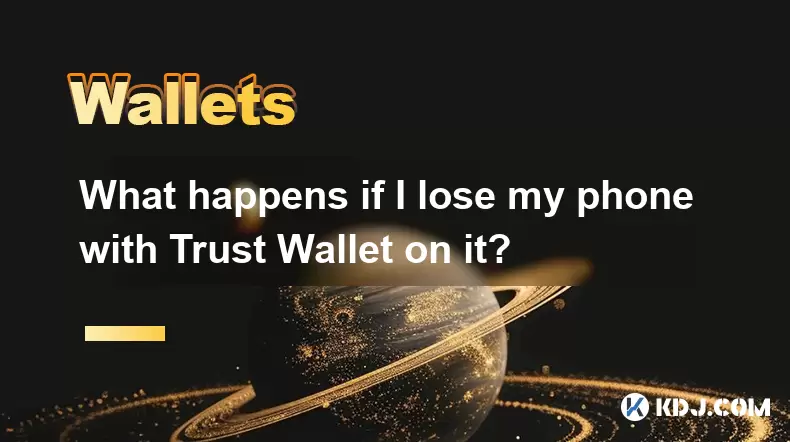
What happens if I lose my phone with Trust Wallet on it?
Jul 01,2025 at 10:03am
Understanding the Risks of Losing Your Phone with Trust WalletLosing your phone can be a stressful experience, especially if you use it to store digital assets through apps like Trust Wallet. The private keys and recovery phrases stored on your device are critical for accessing your cryptocurrencies, and losing access to them could result in permanent l...
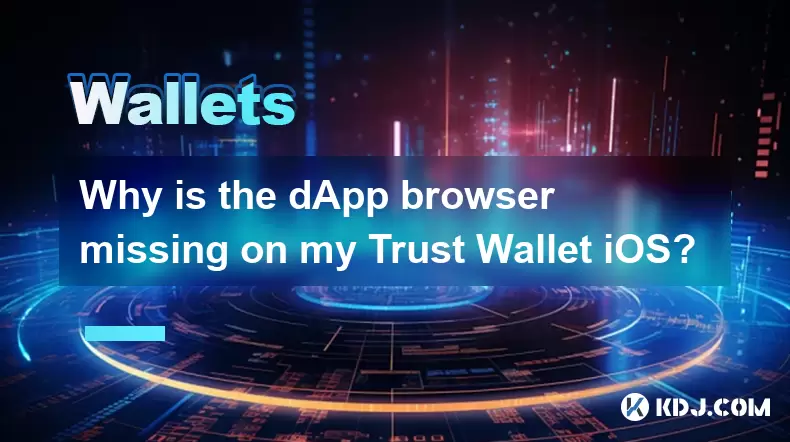
Why is the dApp browser missing on my Trust Wallet iOS?
Jul 01,2025 at 01:01pm
Understanding the dApp Browser on Trust WalletThe dApp browser is a critical feature for interacting with decentralized applications directly from your wallet. In Trust Wallet, this functionality allows users to connect to various blockchain-based services without needing to switch apps or platforms. However, some Trust Wallet iOS users have reported th...
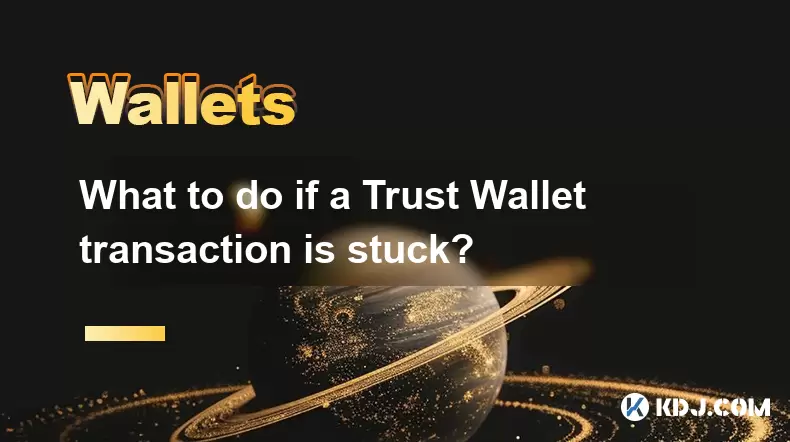
What to do if a Trust Wallet transaction is stuck?
Jul 01,2025 at 12:15pm
Understanding Stuck Transactions in Trust WalletWhen a Trust Wallet transaction is stuck, it typically means that the transaction has been broadcasted to the blockchain network but has not yet been confirmed. This can happen for various reasons, including low gas fees, network congestion, or wallet synchronization issues. A stuck transaction remains in ...

How to opt-out of data collection in Trust Wallet?
Jul 01,2025 at 12:22pm
Understanding Data Collection in Trust WalletTrust Wallet, a popular mobile cryptocurrency wallet, collects certain types of data to enhance user experience and ensure the security of transactions. This data may include device information, usage patterns, crash reports, and anonymous analytics. While Trust Wallet emphasizes that it does not store privat...

Is it safe to enter my Trust Wallet recovery phrase online?
Jul 01,2025 at 11:42am
Understanding the Role of a Recovery Phrase in Trust WalletA recovery phrase, also known as a seed phrase, is a sequence of 12 or 24 words generated during the initial setup of your Trust Wallet. This phrase acts as the ultimate backup to your wallet and grants access to all your funds stored within it. It is essentially the master key to your digital a...

How to claim airdropped tokens in Trust Wallet?
Jul 01,2025 at 12:29pm
What Is an Airdropped Token?An airdropped token is a type of cryptocurrency distributed for free to wallet addresses, often as part of a marketing strategy or blockchain project launch. These tokens are typically sent automatically to eligible wallets or require users to complete certain tasks before claiming them. Trust Wallet, being one of the most wi...

What happens if I lose my phone with Trust Wallet on it?
Jul 01,2025 at 10:03am
Understanding the Risks of Losing Your Phone with Trust WalletLosing your phone can be a stressful experience, especially if you use it to store digital assets through apps like Trust Wallet. The private keys and recovery phrases stored on your device are critical for accessing your cryptocurrencies, and losing access to them could result in permanent l...

Why is the dApp browser missing on my Trust Wallet iOS?
Jul 01,2025 at 01:01pm
Understanding the dApp Browser on Trust WalletThe dApp browser is a critical feature for interacting with decentralized applications directly from your wallet. In Trust Wallet, this functionality allows users to connect to various blockchain-based services without needing to switch apps or platforms. However, some Trust Wallet iOS users have reported th...

What to do if a Trust Wallet transaction is stuck?
Jul 01,2025 at 12:15pm
Understanding Stuck Transactions in Trust WalletWhen a Trust Wallet transaction is stuck, it typically means that the transaction has been broadcasted to the blockchain network but has not yet been confirmed. This can happen for various reasons, including low gas fees, network congestion, or wallet synchronization issues. A stuck transaction remains in ...
See all articles





















